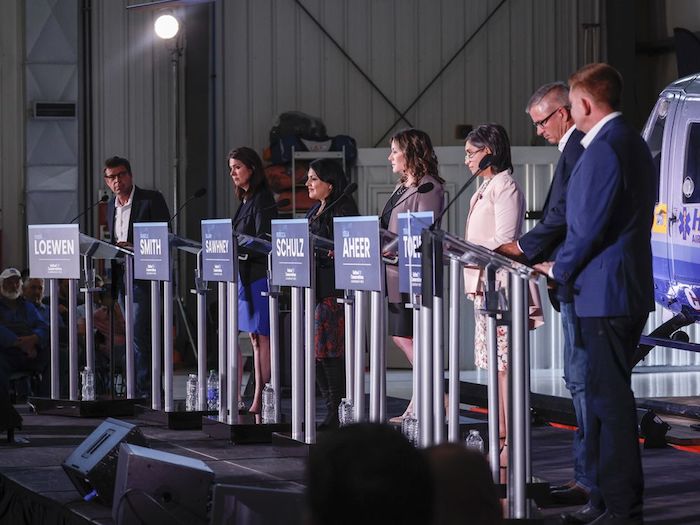Alberta
Alberta VS Ottawa? These are the approaches of four leading candidates

No matter who wins the UCP Leadership race, you can count on a turbulent relationship with Ottawa. Albertans have long had issues with how the Liberal government stifles the critical Oil and Gas industry. Now Alberta’s farmers are finding out what that feels like, as the federal government is introducing measures to reduce the amount of nitrogen fertilizer they use.
To add to the level of animosity between the two governments, a growing number of Alberta UCP supporters are voicing dissatisfaction over Covid restrictions and mandates. This group is active politically, and seems to be rallying behind frontrunner Daniel Smith and likeminded Todd Loewen. The idea is to avoid future restrictions and mandates provincially, and stand up against any federal measures.
It’s no coincidence then, that the leading candidates in the UCP race all have strong platform initiatives to stand up to Ottawa. Here’s what they look like, beginning with Danielle Smith’s “Alberta Sovereignty Act.
Danielle Smith – Alberta Sovereignty Act
It is clear that my proposed Alberta Sovereignty Act has thus far been the central issue of the UCP leadership campaign. Tens of thousands of Albertans have embraced the idea of actually standing up to Ottawa’s attacks against us, rather than usual ineffective letter writing campaigns and complaining.
It’s been both exciting and heartwarming to see hope restored to so many in our Province, and I want them to know how much their faith and confidence in this initiative strengthen my personal resolve to see it through.
Unsurprisingly, many in the media and establishment do not support the Alberta Sovereignty Act and have turned to the tried and tested methods of fearmongering and disinformation to discredit the idea. Unfortunately, some of my fellow UCP candidates may have fallen into their trap.
My hope in releasing this FAQ sheet on the Alberta Sovereignty Act, is that more Albertans and MLAs will take a thoughtful look at this policy, and join the growing majority of Albertans who want to see us stand up to Ottawa, restore our constitutional rights, and take control of our future in this manner.
I am sincerely looking forward to implementing this critically important piece of legislation together.
– Danielle Smith
What is the Alberta Sovereignty Act?
A proposed provincial law that would affirm the authority of the Provincial Legislature to refuse enforcement of any Federal law or policy that violates the jurisdictional rights of Alberta under Sections 92 – 95 of the Constitution or that breaches the Charter Rights of Albertans.
How will it be used?
When the Federal Government institutes a law or policy that appears to violate the constitution or Charter, the Government of Alberta may introduce a Special Motion for a free vote of all MLAs in the Legislature. The Special Motion would include the following:
1. Identification of the Federal law or policy that it deems to be in violation of the Constitution
2. An Outline of the specific harms that violation of the Constitution imposes on the citizens of Alberta
3. Description of the specific actions the Province will take to refuse the enforcement of that Federal law or policy in Alberta
4. A Declaration that by authority of the Alberta Sovereignty Act and notwithstanding the specific Federal law or policy in question, it shall not be enforced by the Provincial Government within Alberta in the manner outlined by the Special Motion
5. Imposition a specific time frame (no more than 24 months) by which the Special Motion will be reviewed in the Legislature
Will a Premier or Governing Party be able to refuse enforcement of any Federal Law or Policy they don’t like?
No, the Alberta Sovereignty Act may not be used unless specifically authorized by way of a free vote of all elected MLAs in the Alberta Legislature, as explained above.
What examples of Federal Laws will the Alberta Sovereignty Act be applied to?
Examples could include:
– Federal mandatory vaccination policies – Charter violation
– Use of Emergencies Act to jail & freeze accounts of peaceful protesters – Charter violation
– Bill C-69 ‘No New Pipelines’ Law – found unconstitutional by Alberta Court of Appeal
– Mandatory cuts to fertilizer use by Alberta Farmers – violation of s.95
– Mandatory emissions and production cuts to Alberta energy projects – violation of s.92A
– Federal gun grabs – violation of s.92(13)
Is the Alberta Sovereignty Act about Separation from Canada?
No, the entire objective of the Alberta Sovereignty Act is to assert Alberta’s Constitutional Rights within Canada to the furthest extent possible by effectively governing itself as a Nation within a Nation, just as Quebec has done for decades and as Saskatchewan is also now considering.
If anything, the restoration of provincial rights and autonomy of every province from the destructive overreach of Ottawa is likely the only viable way for Canada to survive and flourish into the future. Ottawa’s “divide, control and conquer’ policies have Canada on a path of division and disunity. Alberta can and must lead on this issue going forward.
Is the Alberta Sovereignty Act illegal or does it run contrary to the rule of law?
No, just the opposite.
Over the last several years the Federal Government has triggered a constitutional crisis through repeated lawless attacks on provincial constitutional rights and the Charter.
The Trudeau Government has effectively imposed economic sanctions against Alberta (and parts of Saskatchewan and BC) that have resulted in economic chaos.
Hundreds of billions in investment and tax revenues, and hundreds of thousands of jobs, have been lost to these sanctions as investors around the world find it too risky to do business in Alberta’s energy industry. In fact, no new major development of our world class oil sands has been commenced in almost 20 years as a result.
The idea expressed by some UCP leadership candidates that the Alberta Sovereignty Act would “cause chaos” in the markets is naive in the extreme. The “chaos” is already here and has been caused by both Ottawa’s unlawful policies and an utter lack of provincial leadership on effectively pushing back against those attacks.
The fact is the Alberta Sovereignty Act reimposes constitutional rule of law on a lawless Ottawa by reaffirming the critical import of respecting the powers and jurisdiction of the Provinces under the Canadian Constitution.
Brian Jean – Autonomy For Albertans Act
|
I started with policies designed to change how Alberta reacts to the federal government and Canada. I want us to stop being defensive and go on the offensive. We have to stop covering up and we have to take the fight to Canada. The five sets of actions that will protect and enhance Alberta’s Autonomy Within Canada are:
These actions and this approach is very different than how Alberta has traditionally acted. This is very different from what the other leadership candidates are proposing. First this is about acting, about doing something. The “Alberta Sovereignty Act” proposal is purely defensive and reactive. Instead of saying to Canada “we won’t enforce your rules if you come after us,” I am saying that we need to take the initiative.
|
 |
|
My proposals are about taking ACTION and going on the offense. Danielle Smith proposes a purely defensive strategy that surrenders on past fights. Travis Toews has no strategy at all in this area — he wants to continue Jason Kenney’s practice of writing stern and meaningless letters whenever we get stepped on.
When we open the Constitution, we can deal with the issues of: pipelines and right-of-ways, access to tidewater, stopping provinces and the federal government from landlocking provinces, and democratic under-representation. Taking the fight to the rest of Canada is the way to actually get results and reverse the damage.
Passing an unconstitutional “Sovereignty Act” that only kicks in the next time we are punched doesn’t change anything. It will likely encourage Trudeau to hit Alberta harder.
Fighting the efforts of the World Economic Forum to change our society is something Alberta should have been doing all along.
|
 |
|
As is using the courts intelligently including as a way to get expert testimony into the record in important legal debates.
|
 |
|
Fighting back against the insults of Quebec and the federal government should have always been our policy. Instead under Jason Kenney we too often gave away things hoping that other provinces would return the favour. They did not.
|
 |
|
Finally, we should learn from Quebec and have our position in the world recognized by Canada. Alberta is an energy superpower and it should own Canada’s seat at the global table whenever energy issues are discussed.
|
 |
|
||
|
Rebecca Schulz – 100 DAY PROVINCIAL RIGHTS STRATEGY
A Schulz government would immediately start the 100 Day Provincial Rights Action Plan, with clear steps – and a timeline – to fight, negotiate, partner, and strengthen Alberta’s position with Confederation.
“No more letters, no more panels, and no more empty threats – Albertans want action and results when it comes to defending our rights in confederation and seeing our province reach its full potential.” – Rebecca Schulz
Within the first 10 days, a Schulz government will appoint a Deputy Premier and team with the primary focus to act as Alberta’s lead negotiators in strengthening Alberta’s position in Canada.
This will include:
- Presenting the federation with a package of common sense reforms on equalization, fiscal stabilization, and greater provincial control over programs through tax points
- Presenting the federation with a list of federal, provincial overlap in regulations/policy and begin negotiations on disentanglement
- Pursuing an Alberta Pension Plan, Alberta Employment Insurance and an Alberta Revenue Agency
Within the first 50 days, Schulz and the Deputy Premier would present a Provincial Rights
Framework, to identify every legal and constitutional measure possible to stand up against Ottawa’s continued attacks on provincial jurisdiction.
This will include:
- Calling for a Protecting Provincial Rights Summit to bring provinces to the table and identify every measure to stand up for jurisdictional rights against federal interference
- Continuing the fight against the Tanker Ban (C-48) and Trudeau’s No-More Pipelines legislation (C-69), alongside all 10 provinces
- Taking every proactive legal measure possible against Trudeau’s federal emissions and fertilizer caps.
Within the first 100 days, Schulz and the Deputy Premier would present a new Market Access Plan to create political and economic incentives for federal and provincial governments to negotiate with Alberta in good faith for improved trade and market access.
This will include:
- Identifying strategic actions to deter other provinces or levels of government from limiting Alberta’s market access and trade
- Developing criteria for when Alberta will Turn off the Taps through the Preserving Canada’s Economic Prosperity Act.
“You don’t need to spend weeks on the campaign trail to understand how frustrated Albertans are of being pushed around. The emissions and fertilizer caps are just two of the most recent examples of governments interfering with our provincial trade and prosperity. It’s about time Albertans were presented with a real plan to take action.” – Rebecca Schulz

Alberta
Maxime Bernier says it’s ‘astounding’ Alberta is ‘pushing’ COVID boosters, tells Danielle Smith to stop it

From LifeSiteNews
The People’s Party of Canada leader tells the Alberta government: ‘It’s over! Get over it!’
People’s Party of Canada (PPC) leader Maxime Bernier said Alberta Premier Danielle Smith should tell provincial health bureaucrats to “back off” and stop “pushing” the mRNA COVID boosters on “anyone,” considering a recent announcement from health officials recommending yet more COVID shots.
“I find it astounding that Alberta public health bureaucrats are still pushing the mRNA boosters on anyone, and especially on children who have never been at risk, almost two years after almost all other pandemic measures have been ended,” Bernier told LifeSiteNews.
“Danielle Smith’s government should tell its bureaucrats to back off and stop stupidly feeding a needless sense of fear surrounding the virus that lingers among certain groups of society. It’s over! Get over it!”
Earlier this week, officials from Alberta Health Services (AHS), whose chief medical officer throughout the COVID crisis, Dr. Deena Hinshaw, was fired by Smith in 2022, updated its COVID booster recommendations to every “three months” starting at babies only six months old.
“Starting April 15, 2024, select groups of Albertans at high risk of severe outcomes from COVID-19 will be eligible for an additional dose,” the AHS noted on its website.
AHS health officials still assert that all “vaccines are safe, effective and save lives,” and that one can get a COVID shot at the same time as a flu vaccine.
On April 16, Bernier commented on the AHS’s new COVID jab guideline changes on X, in which he asked, “What’s going on in Alberta with their “conservative” government?
Bernier, who was a firm opponent of both the COVID shots and mandates, told LifeSiteNews that AHS’s recommendations are puzzling, given “more and more scientific evidence is emerging of dangerous side effects when injecting from these experimental substances.”
“Even though these are only recommendations, and nothing is mandated, this ‘guidance’ by government agencies influences people’s decisions,” Bernier said.
AHS claims that the booster shots “are anticipated to provide a good immune response against currently circulating strains.”
Those under 18 still need written or verbal consent from their parents to get the shot.
AHS is recommending booster jabs for seniors, healthcare workers as well as those with underlying medical conditions. They also recommend that First Nations people and “members of racialized and other equity-denied communities,” as well as pregnant women get the shots as well.
The COVID shots were heavily promoted by the federal government as well as all provincial governments in Canada, with the Alberta government under former Premier Jason Kenney being no exception.
The mRNA shots themselves have been linked to a multitude of negative and often severe side effects in children.
Danielle Smith took over from Kenney as leader of the United Conservative Party (UCP) on October 11, 2022, after winning the leadership. Kenney was ousted due to low approval ratings and for reneging on promises not to lock Alberta down as well as enacting a vaccine passport. Smith was opposed to COVID jab mandates.
Bernier: It’s ‘deplorable’ some provinces still mandate COVID shot for Heathcare workers
While Alberta does not mandate the COVID shots for healthcare workers anymore, British Columbia still does as well as some health regions in Ontario, a fact that Bernier called “deplorable.”
“I find it deplorable that nurses, doctors and other healthcare workers in B.C. and Ontario still have to be vaccinated to work in hospitals and that thousands of them have not been reintegrated,” Bernier told LifeSiteNews.
“The authoritarian covid measures adopted by all governments have been traumatic enough for millions of Canadians. All of them should be lifted.”
Last year, LifeSiteNews reported on how the details of the Canadian federal government’s COVID-19 vaccine contract with Pfizer for millions of doses of the mRNA-based experimental shots were recently disclosed after being hidden for over three years.
The contract with Pfizer shows the government agreed to accept the unknown long-term safety and efficacy of the shots. The details of the Pfizer contract do not disclose how much the government spent on the jabs.
A bill introduced by Conservative Party leader Pierre Poilievre that would have given Canadians back their “bodily autonomy” by banning future jab mandates was voted down last year after Trudeau’s Liberals and other parties rejected it.
Adverse effects from the first round of COVID shots have resulted in a growing number of Canadians filing for financial compensation over injuries from the jabs via the federal Vaccine Injury Program (VISP).
VISP has already paid well over $11 million to those injured by COVID injections.
Earlier this year, LifeSiteNews reported on how officials from Health Canada have admitted that there is “residual plasmid DNA” in the COVID shots after a Conservative MP asked the agency through an official information request if the DNA fragments were in the shots.
As for Bernier, earlier this month he called out Poilievre for dodging a question regarding Canada’s participation in the United Nations’ pro-abortion Paris Climate Agreement.
Throughout most of the COVID crisis, Canadians from coast to coast were faced with COVID mandates, including jab dictates, put in place by both the provincial and federal governments.
After much pushback, thanks to the Freedom Convoy, most provincial mandates were eliminated by the summer of 2022.
There are currently multiple ongoing class-action lawsuits filed by Canadians adversely affected by COVID mandates.
Alberta
Canada’s advantage as the world’s demand for plastic continues to grow

From the Canadian Energy Centre
By Will Gibson
‘The demand for plastics reflects how essential they are in our lives’
From the clothes on your back to the containers for household products to the pipes and insulation in your home, plastics are interwoven into the fabric of day-to-day life for most Canadians.
And that reliance is projected to grow both in Canada and around the world in the next three decades
The Global Plastics Outlook, published by the Paris-based Organization for Economic Co-operation and Development (OECD), forecasts the use of plastics globally will nearly triple by 2060, driven by economic and population growth.
The use of plastics is projected to double in OECD countries like Canada, the United States and European nations, but the largest increases will take place in Asia and Africa.
“The demand for plastics reflects how essential they are in our lives, whether it is packaging, textiles, building materials or medical equipment,” says Christa Seaman, vice-president, plastics with the Chemical Industry Association of Canada (CIAC), which represents Canada’s plastics producers.
She says as countries look to meet climate and sustainability goals, demand for plastic will grow.
“Plastics in the market today demonstrate their value to our society. Plastics are used to make critical components for solar panels and wind turbines. But they also can play a role in reducing weight in transportation or in ensuring goods that are transported have less weight in their packaging or in their products.”
Canada produces about $35 billion worth of plastic resin and plastic products per year, or over five per cent of Canadian manufacturing sales, according to a 2019 report published by the federal government.
Seaman says Canadian plastic producers have competitive advantages that position them to grow as demand rises at home and abroad. In Alberta, a key opportunity is the abundant supply of natural gas used to make plastic resin.
“As industry and consumer expectations shift for production to reduce emissions, Canada, and particularly Alberta, are extremely well placed to meet increased demand thanks to its supply of low-carbon feedstock. Going forward, production with less emissions is going to be important for companies,” Seaman says.
“You can see that with Dow Chemical’s decision to spend $8.8 billion on a net zero facility in Alberta.”
While modern life would not be possible without plastics, the CIAC says there needs to be better post-use management of plastic products including advanced recycling, or a so-called “circular economy” where plastics are seen as a resource or feedstock for new products, not a waste.
Some companies have already started making significant investments to generate recyclable plastics.
For example, Inter Pipeline Ltd.’s $4.3 billion Heartland Petrochemical Complex near Edmonton started operating in 2023. It produces a recyclable plastic called polypropylene from propane, with 65 per cent lower emissions than the global average thanks to the facility’s integrated design.
Achieving a circular economy – where 90 per cent of post-consumer plastic waste is diverted or recycled – would benefit Canada’s economy, according to the CIAC.
A Deloitte study, commissioned by Environment & Climate Change Canada, estimated diverting or reusing 90 per cent of post-consumer plastic waste by 2030 will save $500 million annually while creating 42,000 direct and indirect jobs. It would also cut Canada’s annual CO2 emissions by 1.8 megatonnes.
Right now, about 85 per cent of plastics end up in Canada’s landfills. To reach the 90 per cent diversion rate, Seaman says Canada must improve its infrastructure to collect and process the plastic waste currently being landfilled.
But she also says the industry rather than municipalities need to take responsibility for recycling plastic waste.
“This concept is referred to as extended producer responsibility. Municipalities have the responsibility for managing recycling within a waste management system. Given the competing costs and priorities, they don’t have the incentive to invest into recycling infrastructure when landfill space was the most cost-effective solution for them,” she says.
“Putting that responsibility on the producers who put the products on the market makes the most sense…The industry is adapting, and we hope government policy will recognize this opportunity for Canada to meet our climate goals while growing our economy.”
-

 COVID-194 hours ago
COVID-194 hours agoCDC Quietly Admits to Covid Policy Failures
-

 COVID-197 hours ago
COVID-197 hours agoJapanese study shows disturbing increase in cancer related deaths during the Covid pandemic
-

 Great Reset2 hours ago
Great Reset2 hours agoClimate expert warns against extreme ‘weather porn’ from alarmists pushing ‘draconian’ policies
-

 Alberta2 days ago
Alberta2 days agoDanielle Smith warns arsonists who start wildfires in Alberta that they will be held accountable
-

 Agriculture2 days ago
Agriculture2 days agoBill C-282, now in the Senate, risks holding back other economic sectors and further burdening consumers
-

 Bruce Dowbiggin1 day ago
Bruce Dowbiggin1 day agoWhy Are Canadian Mayors So Far Left And Out Of Touch?
-

 National2 days ago
National2 days agoCanada’s Governor General slammed for hosting partisan event promoting Trudeau’s ‘hate speech’ bill
-

 Economy1 day ago
Economy1 day agoExtreme Weather and Climate Change





